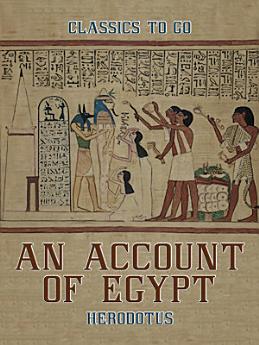An Account of Egypt
May 2022 · Otbebookpublishing
E-book
81
Mga Page
family_home
Kwalipikado
info
reportHindi na-verify ang mga rating at review Matuto Pa
Tungkol sa ebook na ito
This book offers an amazing glimpse into how a historian thought and wrote when there was no prior example of this profession. Herodotus writes with great detail, and is always careful to point out what he saw himself vs. what he was told by others. So we have a dual insight, from reading this, into both the history of Egypt but also how someone thought about history and society 2400 years ago. (Amazon)
Tungkol sa may-akda
Herodotus, often hailed as the "Father of History," was born around 484 BCE in Halicarnassus, a Greek city in what is now Turkey. His life was a tapestry of travel, inquiry, and storytelling, which he wove into his magnum opus, "Histories." This work is a cornerstone of historical writing, offering a rich tapestry of the ancient world, blending fact with folklore.Herodotus's journeys took him across the Mediterranean and beyond, from the bustling markets of Babylon to the ancient pyramids of Egypt. His insatiable curiosity and keen observational skills allowed him to document diverse cultures, customs, and conflicts with a narrative flair that captivated his contemporaries and continues to intrigue modern readers.Controversy often surrounded Herodotus, with critics accusing him of embellishment and bias. Yet, his method of systematically collecting and evaluating evidence laid the groundwork for historical inquiry. His accounts of the Greco-Persian Wars, in particular, provide invaluable insights into the clash of civilizations that shaped Western history.Herodotus's influence extends far beyond his era. His pioneering approach inspired later historians like Thucydides and Xenophon and continues to inform contemporary historical methodology. His work underscores the importance of cultural relativism and the interconnectedness of human societies, ideas that resonate strongly in today's globalized world.Herodotus championed the revolutionary idea that history is not merely a record of events but a complex narrative shaped by human experience and perspective. His legacy endures as a testament to the power of storytelling in understanding our past and present.
I-rate ang e-book na ito
Ipalaam sa amin ang iyong opinyon.
Impormasyon sa pagbabasa
Mga smartphone at tablet
I-install ang Google Play Books app para sa Android at iPad/iPhone. Awtomatiko itong nagsi-sync sa account mo at nagbibigay-daan sa iyong magbasa online o offline nasaan ka man.
Mga laptop at computer
Maaari kang makinig sa mga audiobook na binili sa Google Play gamit ang web browser ng iyong computer.
Mga eReader at iba pang mga device
Para magbasa tungkol sa mga e-ink device gaya ng mga Kobo eReader, kakailanganin mong mag-download ng file at ilipat ito sa iyong device. Sundin ang mga detalyadong tagubilin sa Help Center para mailipat ang mga file sa mga sinusuportahang eReader.







